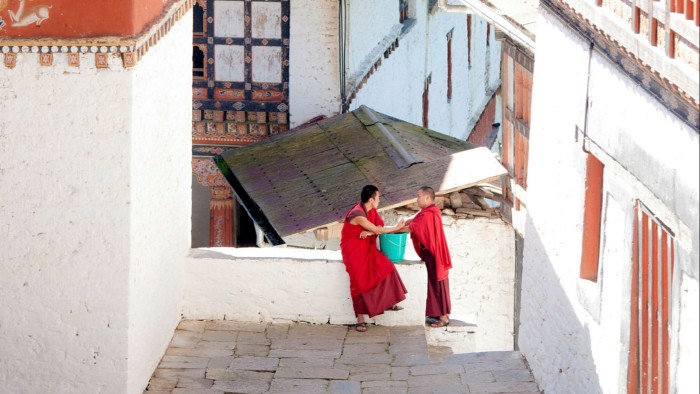Bhutan’s bold plan to introduce the world’s highest tourist levy

Roula Khalaf, Editor of the FT, selects her favourite stories in this weekly newsletter.
Tourist hotspots around the world are considering how best to regulate and manage the return of visitors post-pandemic — Venice, for example, will introduce a daily tax of between €3 and €10 in January. The little Himalayan kingdom of Bhutan, however, is taking the concept to another level. When its borders finally reopen on September 23, tourists will have to pay a “sustainable development fee” of $200 per person per day.
The move, which will be closely watched by other governments and tourism agencies, is designed to encourage “high value, low volume” tourism, maximising economic benefits while limiting the impact on Bhutan’s traditional culture. The country has long been comparatively isolated, not allowing the first tourists to visit until 1974, and not getting television until 1999.
“Covid-19 has allowed us to reset — to rethink how the sector can be best structured and operated, so that it not only benefits Bhutan economically, but socially as well, while keeping carbon footprints low,” said Tandi Dorji, the country’s foreign minister and chair of the Tourism Council of Bhutan, as he announced the new policy. “In the long run, our goal is to create high-value experiences for visitors, and well-paying and professional jobs for our citizens.”
The government says the fee will be used to offset carbon emissions by planting trees and investing in hydropower and electric vehicles, as well as to fund community-led tourism projects.
Some tour operators, however, have criticised the move, saying it risks stifling the sector’s much-needed recovery. World Expeditions says the move will push the price of one of its most popular trips, the 27-day Snowman trek, from £5,890 to almost £9,000. “Increasing the price of a trek by 50 per cent will have huge impact on the future of Bhutan’s tourism industry and, after two years of Covid, would leave us very worried about the potential impact for the livelihoods of our colleagues within Bhutan,” said Gordon Steer, the company’s UK manager.
Tourism to the country was already highly controlled. Previously visitors from countries other than India, Bangladesh and the Maldives had to book guided package tours rather than travel independently and pay a “minimum daily package price” of between $200 and $290 per night. From that $65 went to the government, and the rest towards the travel arrangements. Under the new scheme, visitors will have more flexibility, being able to book hotels and guides direct rather than as part of package tour. Indian tourists will have to pay the new sustainable development fee, but at a much reduced rate, currently only $15.
Follow @ftweekend on Twitter to find out about our latest stories first
Comments